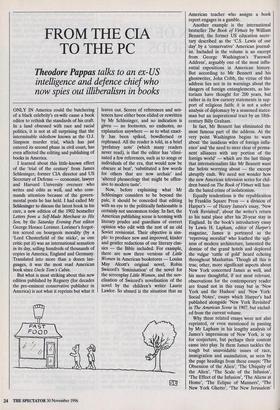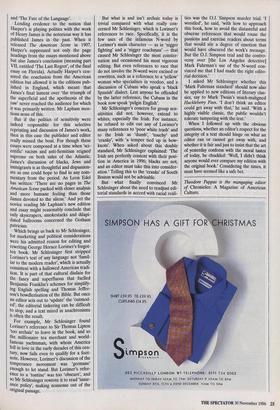FROM THE CIA TO THE PC
Theodore Pappas talks to an ex-US
intelligence and defence chief who now spies out illiberalism in books
ONLY IN America could the butchering of a black celebrity's ex-wife cause a book editor to rethink the standards of his craft. In a land obsessed with race and racial politics, it is not at all surprising that the interminable sideshow known as the O.J. Simpson murder trial, which has just entered its second phase in civil court, has even affected the editing and publishing of books in America.
I learned about this little-known effect of the 'trial of the century' from James Schlesinger, former CIA director and US Secretary of Defense — economist, lawyer and Harvard University overseer who writes and edits as well, and who com- mands attention because of the govern- mental posts he has held. I had called Mr Schlesinger to discuss the latest book in his care, a new edition of the 1902 bestseller Letters from a Self-Made Merchant to His Son, by the Saturday Evening Post editor George Horace Lorirner. Lorimer's forgot- ten screed on bourgeois morality (by a 'Lord Chesterfield of the sticks', as one critic put it) was an international sensation in its day, selling hundreds of thousands of copies in America, England and Germany. Translated into more than a dozen lan- guages, it was the most read American book since Uncle Tom's Cabin.
But what is most striking about this new edition published by Regnery (for decades the pre-eminent conservative publisher in America) is not what it reprints but what it leaves out. Scores of references and sen- tences have either been elided or rewritten by Mr Schlesinger, and no indication is given — no footnotes, no endnotes, no explanation anywhere — as to what exact- ly has been spiked, bowdlerised or rephrased. All the reader is told, in a brief 'prefatory note' (which many readers never read), is that the editor has 'elimi- nated a few references, such as to songs or individuals of the era, that would now be obscure at best', 'substituted a few words for others that are now archaic' and 'altered phraseology that might be offen- sive to modern taste'.
Now, before explaining what Mr Schlesinger considers to be beyond the pale, it should be conceded that editing with an eye to the politically fashionable is certainly not uncommon today. In fact, the American publishing scene is teeming with literary prudes and guardians of correct opinion who edit with the zest of an old Soviet revisionist. Their objective is sim- ple: to produce new and improved, kinder and gentler redactions of our literary clas- sics — the Bible included. For example, there are now three versions of Little Women in American bookstores — Louisa May Alcott's original novel, Robin Swicord's leminisation' of the novel for the screenplay Little Women, and the nov- elisation of Swicord's novelisation of the novel by the children's writer Laurie Lawlor. So absurd is the situation that an American teacher who assigns a book report engages in a gamble.
Another example is the international bestseller The Book of Virtues by William Bennett, the former US education secre- tary described as the `C.S. Lewis of our day' by a 'conservative' American journal- ist. Included in the volume is an excerpt from George Washington's 'Farewell Address', arguably one of the most influ- ential expositions in American history. But according to Mr Bennett and his ghostwriter, John Cribb, the virtue of this address lies not in its warnings about the dangers of foreign entanglements, as his- torians have thought for 200 years, but rather in its few cursory statements in sup- port of religious faith; it is not a sober analysis of diplomacy by a seasoned states- man but an inspirational tract by an 18th- century Billy Graham.
In fact, Mr Bennett has eliminated the most famous part of the address. At the very point Washington begins to warn about 'the insidious wiles of foreign influ- ence' and 'the need to steer clear of perma- nent alliances with any portion of the foreign world' — which are the last things that internationalists like Mr Bennett want the helots worrying about — the excerpt abruptly ends. We need not wonder how the new American television series for chil- dren based on The Book of Virtues will han- dle the hated crime of isolationism.
Equally tendentious is the republication by Franldin Square Press — a division of Harper's — of Henry James's essay, 'New York Revisited', about the writer's return to his natal place after his 20-year stay in England. In the book's introductory essay by Lewis H. Lapham, editor of Harper's magazine, James is portrayed as the 'reproving moralist' who loathed the ugli- ness of modern architecture, lamented the demise of the grand hotels and deplored the vulgar 'rattle of gold' heard echoing throughout Manhattan. Though all this is true, other, more significant aspects about New York concerned James as well, and his more thoughtful, if not most relevant, observations for the contemporary reader are found not in this essay but in 'New York and the Hudson' and 'New York: Social Notes', essays which Harper's had published alongside 'New York Revisited' in The American Scene in 1907, but exclud- ed from the current volume.
Why these related essays were not also reprinted, or even mentioned in passing by Mr Lapham in his lengthy analysis of James's impressions of New York, is up for conjecture, but perhaps their content came into play. In them James tackles the tough but unavoidable issues of race, immigration and assimilation, as seen by the page headings from these essays: 'The Obsession of the Alien', 'The Ubiquity of the Alien', 'The Scale of the Infusion', 'The Effect of the Infusion', 'The Aliens at Home', 'The Eclipse of Manners', 'The New York Ghetto', 'The New Jerusalem' and 'The Fate of the Language'.
Lending credence to the notion that Harper's is playing politics with the work of Henry James is the notorious way it has published James in the past. When it released The American Scene in 1907, Harper's suppressed not only the page headings from the essays mentioned above but also James's conclusion (meaning part VII, entitled 'The Last Regret', of the final essay on Florida). Actually Harper's cen- sored the conclusion from the American edition but allowed it in the editions pub- lished in England, which meant that James's final lament over 'the triumph of the superficial and the apotheosis of the raw' never reached the audience for which it was primarily written. Mr Lapham men- tions none of this.
But if the politics of sensitivity were indeed responsible for this selective reprinting and discussion of James's work, then in this case the publisher and editor really missed the boat. For though these essays were composed at a time when 'sci- entific' racism and anti-Semitism reigned supreme on both sides of the Atlantic, James's discussion of blacks, Jews and immigrants is as thoughtful and dispassion- ate as one could hope to find in any com- mentary from the period. As Leon Edel has written: 'There are no pages in The American Scene packed with closer analysis and more humane feeling than those James devoted to the aliens.' And yet the novice reading Mr Lapham's new edition and essay might reasonably conclude that only skyscrapers, smokestacks and dilapi- dated ballrooms concerned the Gotham patrician.
Which brings us back to Mr Schlesinger, for marketing and political considerations were his admitted reason for editing and rewriting George Horace Lorimer's forgot- ten book. Mr Schlesinger first stripped Lorimer's text of any language not 'famil- iar to the modern reader', which is actually consistent with a hallowed American tradi- tion. It is part of that cultural disdain for the fancy and superfluous that fuelled Benjamin Franklin's schemes for simplify- ing English spelling and Thomas Jeffer- son's bowdlerisation of the Bible. But once an editor sets out to 'update' the 'outmod- ed', the editorial tinkering can be difficult to stop, and a text mired in anachronisms is often the result.
For example, Mr Schlesinger found Lorimer's reference to Sir Thomas Lipton 'too archaic' to leave in the book, and so the millionaire tea merchant and world- famous yachtsman, with whom America fell in love in the early decades of this cen- tury, now fails even to qualify for a foot- note. However, Lorimer's discussion of the temperance movement was 'germane' enough to let stand. But Lorimer's refer- ence to a 'tontine' was too 'obscure', and so Mr Schlesinger rewrote it to read 'insur- ance policy', making nonsense out of the original passage. But what is and isn't archaic today is trivial compared with what really con- cerned Mr Schlesinger, which is Lorimer's references to race. Specifically, it is the few uses of the infamous N-word by Lorimer's main character — as in 'nigger fighting' and a 'nigger coachman' — that caused Mr Schlesinger the most conster- nation and occasioned his most vigorous editing. But even references to race that do not involve the N-word were excised or rewritten, such as a reference to a 'yellow' woman who specialises in voodoo, and a discussion of Cubans who speak a 'black Spanish' dialect. Lest anyone be offended by the latter reference, the Cubans in the book now speak 'pidgin English'.
Mr Schlesinger's concern for group sen- sitivities did not, however, extend to whites, especially the Irish. For instance, he refused to edit out any of Lorimer's many references to 'poor white trash' and to the Irish as 'dumb', 'touchy' and 'cranky', with 'a temper tied up in bow- knots'. When asked about this double standard, Mr Schlesinger explained: 'The Irish are perfectly content with their posi- tion in America in 1996; blacks are not, and an editor must take this into consider- ation.' Telling this to the 'cranks' of South Boston would not be advisable.
But what finally convinced Mr Schlesinger about the need to readjust edi- torial standards in accord with racial reali- ties was the O.J. Simpson murder trial. 'I wrestled', he said, 'with how to approach this book, how to avoid the distasteful and obscene references that would rouse the passions and exercise readers about terms that would stir a degree of emotion that would have obscured the work's message. But the 0.J. Simpson trial and the contro- versy over [the Los Angeles detective] Mark Fuhrman's use of the N-word con- vinced me that I had made the right edito- rial decision.'
I asked Mr Schlesinger whether this 'Mark Fuhrman standard' should now also be applied to new editions of literary clas- sics, say to Mark Twain's much-maligned Hucldebeny Finn. 'I don't think an editor could get away with that,' he said. 'With a highly visible classic, the public wouldn't tolerate tampering with the text.'
When I followed up with the obvious questions, whether an editor's respect for the integrity of a text should hinge on what an editor can or cannot get away with, and whether it is fair and just to insist that the art of yesterday conform with the moral tastes of today, he chuckled: 'Well, I didn't think anyone would ever compare my edition with the original book.' Considering the times, it must have seemed like a safe bet.
Theodore Pappas is the mangaging editor of Chronicles: A Magazine of American Culture.



















































































 Previous page
Previous page